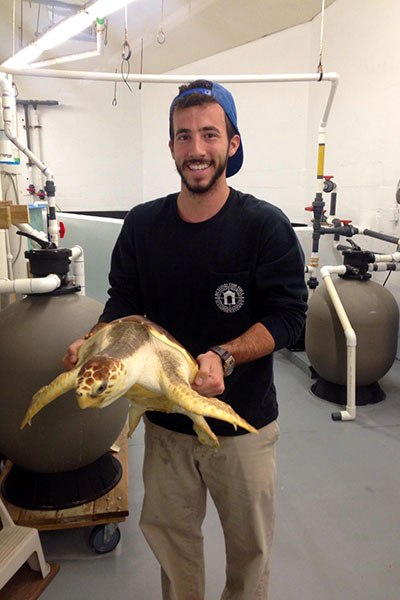July 18, 2025
from the Record, Spring 2025
DRIVER FOR SEA CHANGE
National Oceanic and Atmospheric Association
 “We’re basically a magic school bus,” laughs Nick DeProspero ’13 of his role as operations officer with National Oceanic and Atmospheric Association (NOAA) aboard Pisces. Instead of teaching his passengers about science, though, DeProspero and his crewmates ferry scientists to their underwater laboratories, where they map the seafloor, monitor oceanographic and atmospheric conditions, and support fisheries research.
“We’re basically a magic school bus,” laughs Nick DeProspero ’13 of his role as operations officer with National Oceanic and Atmospheric Association (NOAA) aboard Pisces. Instead of teaching his passengers about science, though, DeProspero and his crewmates ferry scientists to their underwater laboratories, where they map the seafloor, monitor oceanographic and atmospheric conditions, and support fisheries research.
Much more than just a chauffeur, DeProspero is on the front lines of climate action, public safety, and even national defense. NOAA’s data informs accurate weather forecasting, saving lives and protecting infrastructure during major weather events. Its research drives fisheries policymaking, sustaining coastal economics and ensuring global food supply. Its global monitoring systems provide intelligence that helps policymakers navigate the security threats posed by a warming, changing planet.
DeProspero is a scientist at heart and once had dreams of opening a sea turtle rehabilitation center. After developing a prototype tracking tag for hatchlings and working as a marine educator with Georgia Sea Grant, his path shifted when funding ran dry. A serendipitous encounter with a NOAA officer on a walk in the woods opened DeProspero’s eyes to the possibilities of government service. NOAA’s mission to understand and predict climate and environmental changes and conserve and manage coastal and marine ecosystems hit home with DeProspero, and he accepted his first assignment in 2017 as a junior officer aboard the Nancy Foster out of Charleston, South Carolina.
Although he spends most of his days adjacent to science, DeProspero still finds ways to gets his hands dirty as a NOAA diver. When he’s underway, DeProspero says his diving time typically just addresses scrubbing the hull and removing debris from the propellers. During land assignments, though, he gets to tackle more scientific diving, switching out instruments, taking samples, and tagging species.
“Being a conservationist is the reason I joined NOAA,” DeProspero says. “I’m contributing directly by assisting our nation’s scientists and even international scientists who participate in these projects. The ocean touches every border of every continent. It might sound a little romantic, but if we do our job here, it’s going to help the rest of the world.”
At the time of publication, DeProspero now serves as flag secretary for the NOAA Executive Affairs Division of Office of Marine and Aviation Operations.


